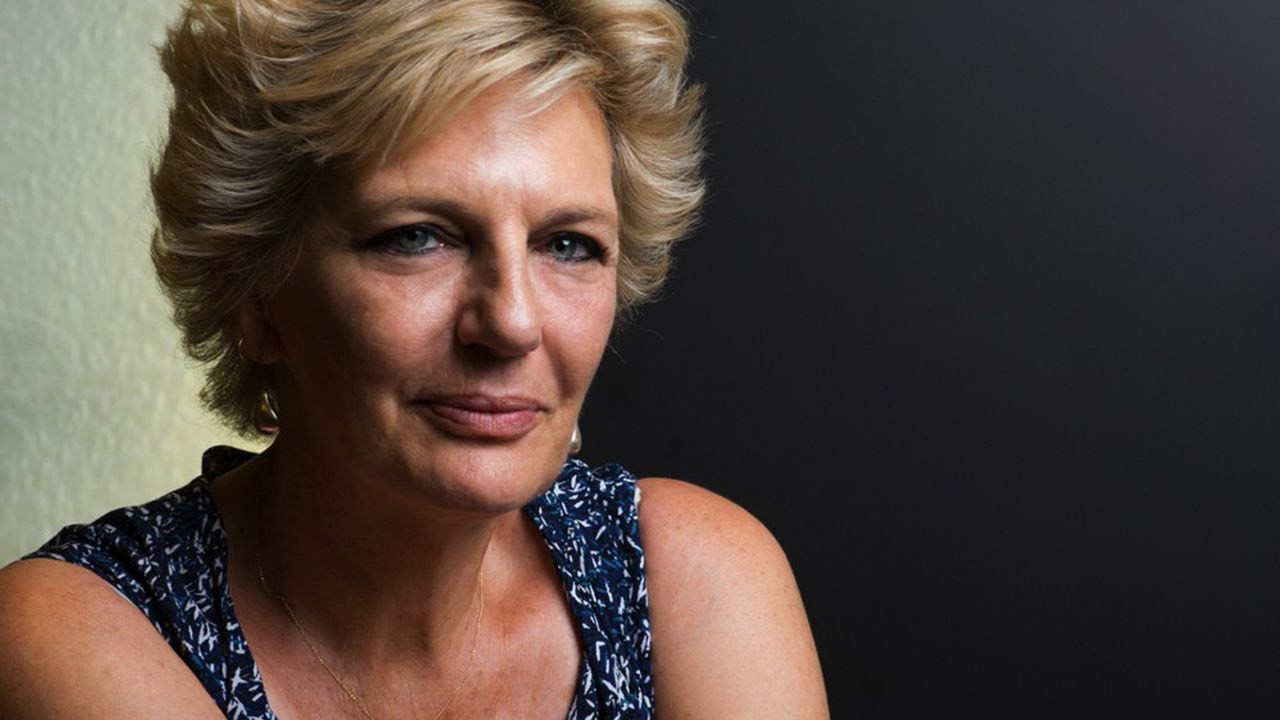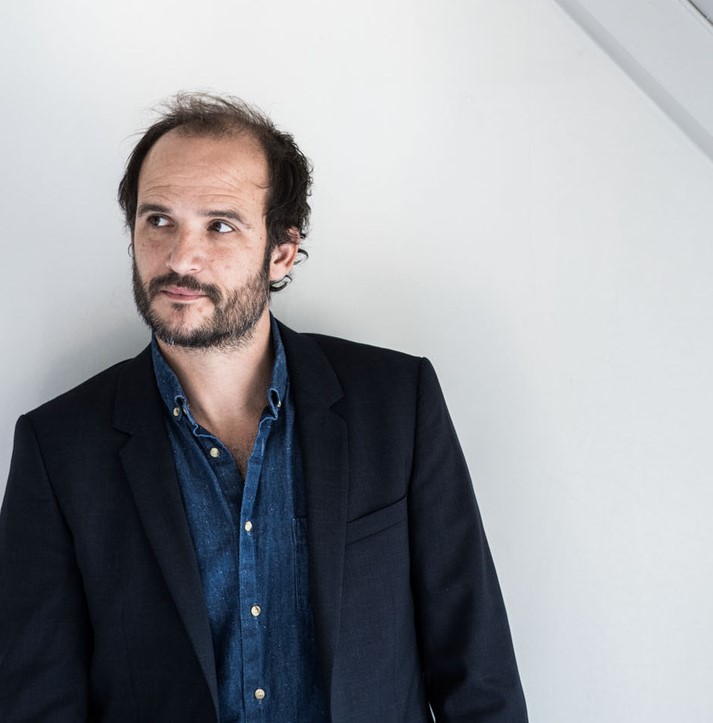Sophie Dulac, President of the Festival:
"If the younger generation believes in the future of the world, then I believe too"
 Sophie Dulac is a personality who counts in French cinema. She knows all the ins and outs since she is at the same time producer, distributor, operator of five historic Parisian cinemas (the Harlequin, the Reflet Médicis, the Escorial Panorama, the Majestic Bastille and the Majestic Passy). Created in 2003, his company Dulac Distribution is interested in French and international auteur cinema, as well as repertory films. In 2012, she launched her Festival on the Avenue des Champs-Elysées where her grandfather, Marcel Bleustein-Blanchet, created the Publicis group ninety-five years ago. While the Festival is in full swing and she is in high demand, she takes the time to answer my questions. Interview with a whole woman, involved, arrived at the cinema late but who devotes a crazy energy to it since. Theyhave done other jobs, had other lives before cinema. What does cinema mean to you? Good question! I graduated in psycho-graphology, a universe that has nothing to do with it. And then opportunities came my way. Today, I have been doing this job for twenty years. I would say that cinema, for me, is the opportunity to explain why culture is essential, contrary to what the government has been saying lately. Essential to cultivate the younger generations, to allow them to have freedom of thought. To keep their independence. And that, for me, is fundamental. Independence is at the heart of your Festival. What is your connection with American cinema? As a teenager, my father dragged me (hanging out, that's the exact term!) at Studio Bertrand, which only showed American films. Heritage films that few people knew about because they were not distributed anywhere else. My love of American auteur cinema comes from there. It is a very rich, singular cinema, which takes a sharp look at social issues. Unfortunately, in France, medium-sized distributors do not dare to show these nuggets. They prefer to play it safe with big productions. The Champs-Elysées Film Festival shows French and American films that do not yet have a distributor. It seemed interesting to me to create a bridge between these two cinemas. At the end of the competition, the winning feature films will each be endowed with 11,000 euros for distribution and theatrical release, which will be given to distributors. If the film does not have one, a French distributor will have one year to buy it and receive the endowment. What are the differences between France and the United States in terms of creation, production and distribution? One of the French particularities is the number of films distributed. In France, every year, 700 films of all nationalities are released in cinemas. That's a lot. And we produce films that don't always have much interest. In the United States, independent films cannot be produced or distributed because they are not considered profitable enough. At the level of creation, there is an aesthetic specific to American cinema and which comes from the physiognomy of the country: grandiose natural scenery. The difference is also at the level of points of view. American independent cinema is full of positive energy, which is felt in the works and in the personalities of the authors. The French, next door, may seem a little jaded. During the Festival, American directors who come to present their films want to discover the work of others, to see all the films. They are curious, enthusiastic, happy to be there. In previous years, you have welcomed stars: Jeff Goldblum, Christopher Walken, Abel Ferrara, Jérémy Irons… How did they react to your invitation? Were they easily convinced? The big difficulty is not the stars but their agents. It is impossible to contact a star live, unless you have his email or private number. Which is rare! And as a matter of principle, agents start by saying no, so as not to put themselves in a delicate situation. So you have to insist and when the invitation reaches the star, there, the locks jump. Just say the three magic words, Champs-Elysées, Paris, June (because usually, the Festival takes place in June) for them to say yes. If they are not on sale. These stars are above all great professionals, who keep their commitments. Once in Paris, they play the game thoroughly, lend themselves wholeheartedly to everything we ask of them. I have only good memories of their coming to the Festival. Magical moments. A few words about programming? All the films screened in the Festival are important in their specificity and the story they tell. Cryptozoo, for example, is a completely crazy animated film. Topside, the beautiful story of a mother and daughter who live in the subway in New York. Sleeping negro, a very personal reflection on the condition of being black. And in addition the director, Skinner Myers, is very friendly. Your company, Dulac Distribution, distributes French and international arthouse films as well as documentaries. Is it important that cinema is a window to the world? Very important. A window to the whole world. This allows you to understand what is happening and to be able to say: I know, and I like it or I don't like it. Know before you believe. This is the opposite of social networks that exhibit images without explaining, or explaining poorly. Cinema has a very playful side, too. We see a film to learn and understand the world, but also to have fun. Are you confident in the future of the world? I have a one-year-old granddaughter, so I can only be confident. Two things reassure me when I observe the young people around me. First of all, their motivation, their willingness to get involved, to do well. And then their ability to adapt to situations, to say "We have to deal with it". The younger generation has great freedom of expression. If she believes in the future of the world, then I believe too.
Sophie Dulac is a personality who counts in French cinema. She knows all the ins and outs since she is at the same time producer, distributor, operator of five historic Parisian cinemas (the Harlequin, the Reflet Médicis, the Escorial Panorama, the Majestic Bastille and the Majestic Passy). Created in 2003, his company Dulac Distribution is interested in French and international auteur cinema, as well as repertory films. In 2012, she launched her Festival on the Avenue des Champs-Elysées where her grandfather, Marcel Bleustein-Blanchet, created the Publicis group ninety-five years ago. While the Festival is in full swing and she is in high demand, she takes the time to answer my questions. Interview with a whole woman, involved, arrived at the cinema late but who devotes a crazy energy to it since. Theyhave done other jobs, had other lives before cinema. What does cinema mean to you? Good question! I graduated in psycho-graphology, a universe that has nothing to do with it. And then opportunities came my way. Today, I have been doing this job for twenty years. I would say that cinema, for me, is the opportunity to explain why culture is essential, contrary to what the government has been saying lately. Essential to cultivate the younger generations, to allow them to have freedom of thought. To keep their independence. And that, for me, is fundamental. Independence is at the heart of your Festival. What is your connection with American cinema? As a teenager, my father dragged me (hanging out, that's the exact term!) at Studio Bertrand, which only showed American films. Heritage films that few people knew about because they were not distributed anywhere else. My love of American auteur cinema comes from there. It is a very rich, singular cinema, which takes a sharp look at social issues. Unfortunately, in France, medium-sized distributors do not dare to show these nuggets. They prefer to play it safe with big productions. The Champs-Elysées Film Festival shows French and American films that do not yet have a distributor. It seemed interesting to me to create a bridge between these two cinemas. At the end of the competition, the winning feature films will each be endowed with 11,000 euros for distribution and theatrical release, which will be given to distributors. If the film does not have one, a French distributor will have one year to buy it and receive the endowment. What are the differences between France and the United States in terms of creation, production and distribution? One of the French particularities is the number of films distributed. In France, every year, 700 films of all nationalities are released in cinemas. That's a lot. And we produce films that don't always have much interest. In the United States, independent films cannot be produced or distributed because they are not considered profitable enough. At the level of creation, there is an aesthetic specific to American cinema and which comes from the physiognomy of the country: grandiose natural scenery. The difference is also at the level of points of view. American independent cinema is full of positive energy, which is felt in the works and in the personalities of the authors. The French, next door, may seem a little jaded. During the Festival, American directors who come to present their films want to discover the work of others, to see all the films. They are curious, enthusiastic, happy to be there. In previous years, you have welcomed stars: Jeff Goldblum, Christopher Walken, Abel Ferrara, Jérémy Irons… How did they react to your invitation? Were they easily convinced? The big difficulty is not the stars but their agents. It is impossible to contact a star live, unless you have his email or private number. Which is rare! And as a matter of principle, agents start by saying no, so as not to put themselves in a delicate situation. So you have to insist and when the invitation reaches the star, there, the locks jump. Just say the three magic words, Champs-Elysées, Paris, June (because usually, the Festival takes place in June) for them to say yes. If they are not on sale. These stars are above all great professionals, who keep their commitments. Once in Paris, they play the game thoroughly, lend themselves wholeheartedly to everything we ask of them. I have only good memories of their coming to the Festival. Magical moments. A few words about programming? All the films screened in the Festival are important in their specificity and the story they tell. Cryptozoo, for example, is a completely crazy animated film. Topside, the beautiful story of a mother and daughter who live in the subway in New York. Sleeping negro, a very personal reflection on the condition of being black. And in addition the director, Skinner Myers, is very friendly. Your company, Dulac Distribution, distributes French and international arthouse films as well as documentaries. Is it important that cinema is a window to the world? Very important. A window to the whole world. This allows you to understand what is happening and to be able to say: I know, and I like it or I don't like it. Know before you believe. This is the opposite of social networks that exhibit images without explaining, or explaining poorly. Cinema has a very playful side, too. We see a film to learn and understand the world, but also to have fun. Are you confident in the future of the world? I have a one-year-old granddaughter, so I can only be confident. Two things reassure me when I observe the young people around me. First of all, their motivation, their willingness to get involved, to do well. And then their ability to adapt to situations, to say "We have to deal with it". The younger generation has great freedom of expression. If she believes in the future of the world, then I believe too.
Thomas Lilti, President of the Feature Film Jury: "I take my role with humility"
 Thomas Lilti practiced medicine for more than ten years and made his experience the substance of his films, a mixture of social chronicle, autobiographical elements and romantic feelings. Author and director of Hippocrates, Médecin de campagne and Première année, among others, he wrote and directed in 2018 the first season of the series Hippocrates for Canal+. In March 2020, the filming of season 2 was interrupted by the COVID-19 health crisis. The opportunity for Thomas Lilti to temporarily return to the hospital as a caregiver. From this experience, he draws an account published by Grasset: Le Serment and published in January 2021. Season 2 of Hippocrates airs in April 2021. Tell us about your relationship with cinema. It all started in childhood. I remember a happy but boring childhood. I was bored a lot at school, so I developed an imagination to fight against this boredom. The desire to tell stories comes from there. My mother was a literature teacher but I was never a very good reader, so I retreated into movies. In high school, I told my parents that I wanted to study film but they asked me to study medicine, like my father. I gave in to family pressure but the desire for cinema never left me. In 2007, I directed my first feature film, Blindfolded. The reception was not good. For Hippocrates, I brought together my two favorite worlds: medicine and cinema. The chemistry worked, the film was a success and the beginning of my adventure. Why did you accept the Presidency of the Jury? In 2014, I presented Hippocrates in this Festival, for the third edition. A very important moment for me because this film was decisive for the rest of my career. And then, the Festival takes place on the Champs-Elysées, where I went to see films with my friends in the 90s. The Lincoln, the Balzac, the Publicis… Rooms that I frequented a lot. I lived in the western suburbs and I came with the RER A. After the movie, we would go for a drink, snack, and I would take the RER back home. These are great, beautiful memories. At that time, the Champs-Elysées embodied cinema, which is less the case today. Besides the fact that I love American cinema, I accepted because Sophie Dulac is a great personality of cinema. She is a demanding, courageous woman who believes in cinema and fights for young authors. It's very hard today to see independent films in theaters because the actors are not known, among other things. The Champs-Elysées Film Festival is the only time to see these films, for them to be discovered by the public. I take on this role of President with great humility. Moreover, I consider myself more like a member of the Jury among others. For me, it is a huge opportunity to share my taste for cinema, to see films with kindness and to talk about them, to exchange with the other members of the Jury. We are all different but we get along very well. How is cinema doing today? Evil. Admissions have dropped and with them, the money to be able to produce films. The entire sector is in difficulty, producers, distributors, operators. But paradoxically, this crisis makes people ask questions. They want to make intimate, personal films, but that will touch the audience. It's a big challenge. One of the main difficulties today is the lack of editorialization, advice on which films to see. Every week, there are a lot of films that come out in theaters and the viewer is lost. Only one or two films will emerge, stand out. The others will only remain on the bill for a short time, and will disappear before the public has had time to see them. There are too many films because we have lost the neighborhood cinema side. We see a lot of first films, but there are also a lot of directors who have trouble getting produced. Access to film professions is difficult. A lot of people dream of making films and there is a wide range of training courses that nurture and encourage this dream. In my time, this was not the case. There was La Fémis, Louis Lumière and that's it. Making a film requires talent but above all a lot, a lot of energy. Until September 21. All information about champselyséesfilmfestival. To read the article about the Festival.
Thomas Lilti practiced medicine for more than ten years and made his experience the substance of his films, a mixture of social chronicle, autobiographical elements and romantic feelings. Author and director of Hippocrates, Médecin de campagne and Première année, among others, he wrote and directed in 2018 the first season of the series Hippocrates for Canal+. In March 2020, the filming of season 2 was interrupted by the COVID-19 health crisis. The opportunity for Thomas Lilti to temporarily return to the hospital as a caregiver. From this experience, he draws an account published by Grasset: Le Serment and published in January 2021. Season 2 of Hippocrates airs in April 2021. Tell us about your relationship with cinema. It all started in childhood. I remember a happy but boring childhood. I was bored a lot at school, so I developed an imagination to fight against this boredom. The desire to tell stories comes from there. My mother was a literature teacher but I was never a very good reader, so I retreated into movies. In high school, I told my parents that I wanted to study film but they asked me to study medicine, like my father. I gave in to family pressure but the desire for cinema never left me. In 2007, I directed my first feature film, Blindfolded. The reception was not good. For Hippocrates, I brought together my two favorite worlds: medicine and cinema. The chemistry worked, the film was a success and the beginning of my adventure. Why did you accept the Presidency of the Jury? In 2014, I presented Hippocrates in this Festival, for the third edition. A very important moment for me because this film was decisive for the rest of my career. And then, the Festival takes place on the Champs-Elysées, where I went to see films with my friends in the 90s. The Lincoln, the Balzac, the Publicis… Rooms that I frequented a lot. I lived in the western suburbs and I came with the RER A. After the movie, we would go for a drink, snack, and I would take the RER back home. These are great, beautiful memories. At that time, the Champs-Elysées embodied cinema, which is less the case today. Besides the fact that I love American cinema, I accepted because Sophie Dulac is a great personality of cinema. She is a demanding, courageous woman who believes in cinema and fights for young authors. It's very hard today to see independent films in theaters because the actors are not known, among other things. The Champs-Elysées Film Festival is the only time to see these films, for them to be discovered by the public. I take on this role of President with great humility. Moreover, I consider myself more like a member of the Jury among others. For me, it is a huge opportunity to share my taste for cinema, to see films with kindness and to talk about them, to exchange with the other members of the Jury. We are all different but we get along very well. How is cinema doing today? Evil. Admissions have dropped and with them, the money to be able to produce films. The entire sector is in difficulty, producers, distributors, operators. But paradoxically, this crisis makes people ask questions. They want to make intimate, personal films, but that will touch the audience. It's a big challenge. One of the main difficulties today is the lack of editorialization, advice on which films to see. Every week, there are a lot of films that come out in theaters and the viewer is lost. Only one or two films will emerge, stand out. The others will only remain on the bill for a short time, and will disappear before the public has had time to see them. There are too many films because we have lost the neighborhood cinema side. We see a lot of first films, but there are also a lot of directors who have trouble getting produced. Access to film professions is difficult. A lot of people dream of making films and there is a wide range of training courses that nurture and encourage this dream. In my time, this was not the case. There was La Fémis, Louis Lumière and that's it. Making a film requires talent but above all a lot, a lot of energy. Until September 21. All information about champselyséesfilmfestival. To read the article about the Festival.








































